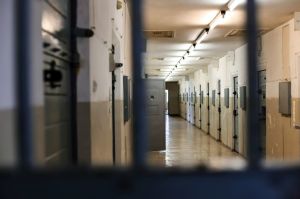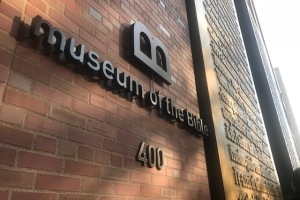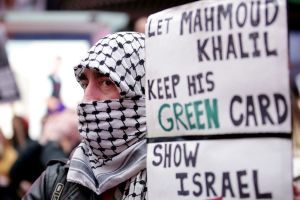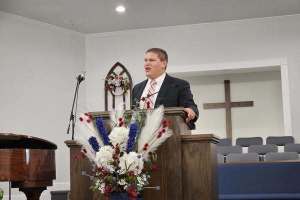Bush: China Must End Detentions, Ensure Freedoms
The same day of his arrival in Beijing for the Olympics, President Bush is carrying a message of "deep concerns" about the state of human rights in China and urging the communist nation to allow political freedoms for its citizens.
"America stands in firm opposition to China's detention of political dissidents, human rights advocates and religious activists," Bush will declare in the marquee speech of his three-nation Asia trip. "We speak out for a free press, freedom of assembly and labor rights — not to antagonize China's leaders, but because trusting its people with greater freedom is the only way for China to develop its full potential."
Bush delivers the address in a Bangkok, Thailand, convention center Thursday morning to a crowd of foreign diplomats, Thai government leaders and business officials, before flying to China later that day.
Bush arrived in Bangkok on Wednesday evening, and then traveled immediately to a meeting with Thai Prime Minister Samak Sundaravej. The White House released the text of the president's speech earlier Wednesday, nearly 18 hours in advance, as Bush traveled to Thailand from South Korea.
The speech was planned as a summary of what Bush says is the "stronger engagement" with strategically crucial Asia that has marked his presidency. But his remarks on China, among his most directly critical ever in public, stand out.
He says he has built a relationship with China's leaders — through opposing independence for Taiwan, cooperating in negotiations over North Korea's nuclear program and sharing economic interests, for example — that has allowed him to be "honest and direct" on sensitive internal matters.
"I have spoken clearly, candidly and consistently with China's leaders about our deep concerns over religious freedom and human rights," Bush says in the prepared text.
Earlier Wednesday, during a news conference in Seoul with South Korean President Lee Myung-bak, Bush said China's pre-Olympics crackdown on dissent has been "a mistake."
The communist country considers the Olympics a source of huge national pride and is pulling out all stops to ensure no embarrassments. It has rounded up dissidents, detaining some. Journalists covering the games have objected to restrictions on Internet sites, worried about possible censorship.
Bush objected, saying, "You ought to welcome people being able to express their minds."
In Thursday's speech, the president is softening his message somewhat by saying any changes in China would have to come "on its own terms and in keeping with its own history and traditions."
"Ultimately only China can decide what course it will follow," he says.
Still, his strong words are likely to anger the leadership in Beijing.
Bush already drew the ire of Chinese officials by meeting ahead of his trip at the White House with prominent Chinese exiles and dissidents.
Bush has made clear that while he is going to Beijing mostly as an Olympics fan, he would talk frankly with Chinese President Hu Jintao during their private meetings. It was also known that he would speak publicly about religious freedom after attending a Beijing church service and that the White House was trying to arrange other meetings while he is in Beijing over four days.
In addition, White House press secretary Dana Perino said the U.S. would protest China's decision to deny a visa for former Olympic speed skater Joey Cheek, who was planning to travel to Beijing to urge that the Chinese government help make peace in the war-torn Darfur section of Sudan.
"We are taking the matter very seriously," Perino said Wednesday. "We would hope that they would change their minds."
Bush's Bangkok remarks devote only a few sentences to criticism for the "tyranny" in Myanmar, Thailand's neighbor, which is ruled by a military junta. He called for the release of the country's democracy icon, Aung San Suu Kyi, as well as other political prisoners.
Though Samak, the Thai prime minister, regards himself as a friend of Myanmar's generals, Bush planned to heap praise on his Thai hosts, calling the country a leader in the region and saluting them for restoration of democracy.
This, Bush says in marking 175 years of U.S.-Thai relations, "has proved that liberty and law reign here in the `Land of the Free.'"
A bloodless 2006 army coup toppled former Prime Minister Thaksin Shinawatra Thaksin from office. The interim government relinquished power after more than a year in office, allowing a democratic election last December that saw Thaksin's ally Samak sweep into power. Samak has been accused of trying to change the constitution to hold onto power and to prevent Thaksin from facing corruption-related charges.
Bush kicked off the last Asia tour of his presidency in South Korea.
From there, at Lee's side, he offered poverty-wracked North Korea hope that it could someday share in its southern neighbor's economic prosperity and spoke of a future in which it is no longer part of the "axis of evil" he first outlined in 2002.
First, though, he said the reclusive Stalinist regime must meet the step-by-step denuclearization demands contained in a framework agreement reached in six-party talks involving both Koreas, the United States, Japan, China and Russia. The North must also improve its human rights record, Bush said.
"North Korea traps its people in misery and isolation," the president said.
North Korea expects Bush to remove it from the U.S. list of terror-sponsoring countries as soon as next weekend, as the president said he would when the North destroyed its nuclear reactor cooling tower in June. That offer has always been contingent on North Korea providing a full account of its nuclear activities.
Bush said North Korea — which has a history of unpredictability and has repeatedly used negotiations over its nuclear program to wring aid and concessions from the West — must first do its agreed-upon part and accept international terms for verifying its dismantlement efforts. "I don't know whether or not they're going to give up their weapons," Bush said. "I really don't know. I don't think either of us knows."
Said Lee, "I have faith we will be able to move to the verification process, then to the next step."
The North, which exploded a nuclear device in 2006, is believed by experts to have produced enough weapons-grade plutonium to make as many as 10 nuclear bombs, and the U.S. has accused Pyongyang of running a second weapons program based on uranium. Actual destruction of weapons — the ultimate goal of six-party talks with North Korea — is months away at the least.
Lee, a pro-American leader who took office in February, has seen his approval ratings tumble after lifting a ban on U.S. beef imports despite public fears about its safety. The public outcry prompted street protests that drew attention worldwide. But opposition has settled since Lee made changes, and the leaders even ate American beef at a luncheon hosted by Lee.
Associated Press writer Paul Alexander contributed to this story from Seoul, South Korea.





























